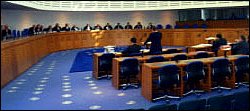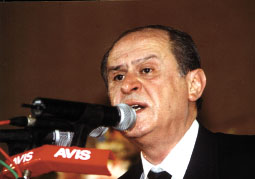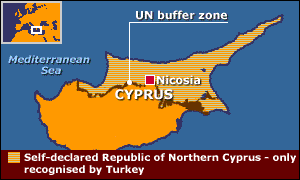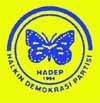12
June 2002
![]()
2. "Deputy Turkey PM: No Rush to Join EU", Turkey won't be able to enter the European Union for years, and has no need to rush ahead with EU-demanded reforms, the deputy prime minister said Tuesday. Devlet Bahceli said his Nationalist Action Party, the second-largest member of Turkey's three-party coalition government, would never accept the EU's demands, which include allowing Kurds the right to broadcasting and education in their own language.
3. "Greek Cypriots say Ankara boosting tensions with more troops in north", Cypriot Defence Minister Socrates Hasikos Tuesday accused Ankara of waging a war of nerves by sending an additional 5,500 troops to the Turkish-held north of the divided island, bolstering its military presence there to more than 40,000.
4. "Kurdish language student trial begins in Diyarbakir", the trial of 27 children accused of carrying out a demonstration regarding Kurdish language education in Carikli Community began in Diyarbakir on Monday.
5. "Controversial Kurdish 'federal' state", 'Federal,' or 'separate,' Kurdish state? Flag, march, and capital city for 'federal' state.
6. "Karayalcin hints at alliance with HADEP", newly founded Social Democratic People's Party (SHP) leader Murat Karayalcin said that his party was willing to work in close cooperation with other social democratic parties, in line with the establishment and realization of democracy and social democracy in Turkey, signaling that the SHP might make an election alliance with Turkey's only pro-Kurdish party, the People's Democracy Party (HADEP).
1. - AFP - "Turkey violated rights of Kurdish deputies, European court rules":
STRASBOURG / 11 June 2002
The European Court of Human Rights ruled Tuesday that Turkey had
violated the right to free elections by stripping 13 Kurdish deputies
of their parliamentary seats, court officials said.
"The measure was incompatible with the very essence of the right to stand for election and to hold parliamentary office," the court said in a statement. It awarded the deputies 50,000 euros (47,000 dollars) each in damages and sums of up to 10,500 each to cover expenses. The court agreed with the 13 applicants, former deputies of the outlawed pro-Kurdish Democracy Party (DEP), that Ankara had violated the Council of Europe's human rights charter, which Turkey has signed.
Turkey, one of 13 countries waiting to join the European Union, has not yet been granted official candidate status because its government has not met basic EU criteria on democracy, human rights and the rule of law. The DEP was formed in 1993 but in June 1994 the constitutional court ordered its dissolution, on the grounds that it infringed the constitution and some of its members' statements could undermine the integrity of the state, and ended the DEP deputies' parliamentary mandates. Some of the deputies then fled abroad, having lost their parliamentary immunity and fearing prosecution for encouraging Kurdish separatism and engaging in anti-state activity. Five of the former deputies -- Leyla Zana, Ahmet Turk, Mehmet Atip Dicle, Orhan Dogan and Selim Sadak -- were condemned in 1994 to 15 years in prison for belonging to an armed group.
Zana, who won the European Parliament's human rights award in 1995, has become something of a cause celebre since her imprisonment. Seadt Yurttas received seven and a half years for aiding and abetting an armed group, and a seventh deputy, Sirri Sakik, received three years for separatist propaganda in the same year. Turkey's highest court of appeal in 1995 overturned two of the 15-year sentences, freeing the deputies provisionally, but upheld the other sentences. The European court is also due to hear arguments this week on another rights case involving the Turkish government's dissolution of the Islamist party Refah.
Last week it condemned Turkey for violating the rights
of a half-blind lawyer and writer, who was sentenced to life in prison
in 1985 for giving a pro-Kurdish speech. The east and southeast of the
country have seen some 15 years of civil war between Turkish forces
and the secessionist Kurdistan Workers' Party (PKK). The Kurdish minority
makes up between 12 and 15 million of Turkey's total population of around
66 milion. ![]()
2. - AP - "Deputy Turkey PM: No Rush to Join EU":
ANKARA / 11 June 2002
Turkey won't be able to enter the European Union for years, and
has no need to rush ahead with EU-demanded reforms, the deputy prime
minister said Tuesday.
Devlet Bahceli said his Nationalist Action Party, the second-largest member of Turkey's three-party coalition government, would never accept the EU's demands, which include allowing Kurds the right to broadcasting and education in their own language.
The nationalists ``will under no circumstances be part of such a move,'' Bahceli told lawmakers from his party. He said Turkey's EU membership could not be achieved before 2010-2013.
The comments came amid turmoil over Turkey's EU bid, which threatens to break up the coalition. Bahceli's coalition partners both favor swift moves to meet EU criteria for membership.
The strains on the coalition have been exacerbated by the illness of Prime Minister Bulent Ecevit, who missed key meetings on the EU as he recovers at home after being hospitalized twice last month.
The nationalists won votes in the last election by demanding the execution of Kurdish rebel leader Abdullah Ocalan, and opposing moves demanded by the EU to give Kurds wider rights.
The EU has also demanded Turkey abolish the death penalty.
``This murderer has become a condition for Turkey even to be given a date to start membership talks,'' Bahceli said, referring to Ocalan. ``If that is not injustice and disrespect to our country, then what is it?''
Turkey fought a 15-year war with Ocalan's rebels, at a
cost of some 37,000 lives. The fighting virtually ceased after Ocalan's
capture in 1999. ![]()
3. - AFP - "Greek Cypriots say Ankara boosting tensions with more troops in north":
NICOSIA / 11 June 2002
Cypriot Defence Minister Socrates Hasikos Tuesday accused Ankara
of waging a war of nerves by sending an additional 5,500 troops to the
Turkish-held north of the divided island, bolstering its military presence
there to more than 40,000.
"This is a systematic effort on behalf of Turkey to create tension, it is no longer confined to words but progressed to action," Hasikos told a news conference Tuesday. He said Turkey's act of military brinkmanship was a deliberate move to escalate tension in the region ahead of Cyprus' looming EU accession. "Turkey wants to appear convincing in its efforts which are none other than to prevent Cyprus joining the European Union," said Hasikos.
"It's a war of nerves against the Greek Cypriots and the EU," he added. Leading EU candidate Cyprus expects to wrap up its accession negotiation by July and join an enlarged European family by January 2004. Ankara has threatened to annex the island's northern third if Cyprus enters before a political settlement is reached, but the EU has often stated that settlement is not a condition for entry. Hasikos said the information on the troops increase was "cross-checked and verified" and observed by the United Nations here.
Extra troops and mobile field hospitals were dispatched to the north from May 24 in an operation completed two days ago, said the minister. However, he said there was no evidence about new weapons systems being shipped over. When asked to confirm Hasikos' claims, UN spokesman Brian Kelly would say only that "any relevant information that we have on this we have sent to New York."
Government spokesman Michalis Papapetrou said Nicosia would make "specific protests" against the Turkish action. Cypriot President Glafcos Clerides and Turkish Cypriot leader Rauf Denktash have held talks since mid-January with few signs of the compromise needed to achieve a breakthrough by the end of June target date to end 28 years of division. The Greek Cypriots argue that no progress in the talks can be achieved until Denktash budges from his position of demanding separate sovereignty for his self-declared Turkish Republic of Northern Cyprus (TRNC), which is recognised only by Ankara.
Denktash charged Monday the EU was trying to force the disappearance of the TRNC, which would indicate "a one-way ticket to the cemetery" for the Turkish community on the island. "We are facing efforts for the non-acceptance of our sovereignty, the recognition of the right to return of Greek refugees to their former homes ... and the disappearance of the TRNC," he said. "The carrot of Europe is being using to trap us," he said, quoted by Turkey's Anatolia news agency, warning of a permanent division of Cyprus.
The Turkish Cypriots say reunification should be based
on a loose confederation of two states, while the Greek Cypriots and
the international community favor a tighter bi-zonal, bi-communal federation.
A coup in Nicosia aimed at union with Greece prompted the 1974 invasion
of Turkish troops who have occupied the northern third of the island
ever since. ![]()
4. - Turkish Daily News - "Kurdish language student trial begins in Diyarbakir":
Ankara / 12 June 2002
The trial of 27 children accused of carrying out a demonstration
regarding Kurdish language education in Carikli Community began in Diyarbakir
on Monday.
Due to the young age of the defendants the opening hearing was closed to the press however, it was learned that during the hearing the defendants claimed that they had congregated because it was Human Rights Week. The defendants pleaded innocent and denied allegations that they had shouted slogans related to Kurdish language education.
Of the 27 children, two did not appear before the tribunal because investigations into their involvement are still continuing.
The defendants stand accused of aiding and abetting terrorism
and prosecutors are seeking a prison sentence of three years and nine
months for each defendant. ![]()
5. - Turkish Daily News - "Controversial Kurdish 'federal' state":
'Federal,' or 'separate,' Kurdish state? Flag, march, and capital city for 'federal' state.
By Ozgur Eksi / 11 June 2002
At a conference held in Washington, organized in cooperation with
American University's Center for Global Peace and the Mesoud Barzani
Global Kurdish Institute, Kurdistan Democracy Party (KDP) member Hosyar
Zebani stated, "We want a federation, not an independent state."
This statement, which on the surface seems to be a new approach to an old problem, may actually have been an attempt to clarify the intentions of a proposal, claimed to have very recently been presented to the United States. The proposal may have been open to interpretation, suggesting a "separate" state, rather than a "federation." However, the United States claims that no such paper was presented.
It has been widely speculated that KDP and Patriotic Union of Kurdistan (PUK) representatives met in Germany in April, and according to some sources, flew to the United States to present a paper, agreed upon by the KDP and the PUK.
It has also been claimed that the meeting in Germany took place at an air base belonging to the United States. It has also been said that the report, which was claimed to have been handed in to United States, was not handed in at all.
While there are many speculations being made, there are only two things most people agree on: The KDP have prepared a proposal, outlined below; and a "a federal state" for Kurds was mentioned at the Washington conference.
The key elements of the proposal
The KDP proposes the creation of a constitution, which outlines the future of the "Iraqi Federation." According to the proposal, the Constitution would consist of 77 articles and would divide the Iraqi state into two federations. The new state, called the "Iraqi Federal Republic," includes Arab and Kurdish federations, with Turkoman and Syriac minorities.
The key articles
The "Kurdish region"
According to Article No. 2, the Kurdish region would include Kerkuk, Suleymaniye, Erbil, Duhok, Seyhan, Akra, Sincar, Zummar, Hanekin, Mendeli, and Bedre.
Kerkuk to be "capital"
Article No. 5 of the proposal states that Kerkuk would be the capital of "Kurdistan."
Federal state with a "special flag"
Article No. 6 proposes that the Kurdish region would have its own flag, different from the flag of the Iraqi Federal Republic.
Can a federation establish international relations?
According to Article No. 33, the Kurdish Parliament would be able to make amendments to the Constitution with a 2/3 majority. Laws would be amended by Parliament. More importantly, the "Kurdish federation" would be able to establish international relations. The same article gives power to Parliament on the ratification of international relations. The parliament would ratify agreements on economic, cultural, educational, administrative, security and border issues.
Turkoman minority
Article No. 7 deals with, among other issues, the main educational and cultural language. The Turkoman and Syriac minorities would learn Kurdish besides their mother tongue.
Do not open Pandora's box
Retired ambassador and Turkish Economic and Social Studies
Foundation (TESEV) Chairman Ozdem Sanberk told the Iraqi Kurds at the
conference that they should not try to establish an independent state,
because this would disturb regional balances and would "open a
Pandora's box," while Iraqi Turkoman Front Washington Representative
Orhan Ketene stated that the history and geography invented by the Kurds
would not be accepted by the Turkomans. ![]()
6. - Turkish Daily News - "Karayalcin hints at alliance with HADEP":
ANKARA / 12 June 2002
Newly founded Social Democratic People's Party (SHP) leader Murat
Karayalcin said that his party was willing to work in close cooperation
with other social democratic parties, in line with the establishment
and realization of democracy and social democracy in Turkey, signaling
that the SHP might make an election alliance with Turkey's only pro-Kurdish
party, the People's Democracy Party (HADEP).
HADEP Chairman Murat Bozlak and an accompanying mission visited Karayalcin at his office at the SHP headquarters. Karayalcin, hinting at a possible election alliance, said that issue would be evaluated in further detail once the country came to the election stage.
Stressing that his party was critical of the Political Parties and Election laws, Karayalcin noted that during their visit to President Ahmet Necdet Sezer they had suggested a series of changes to these laws, which would enable election alliances among political parties. He stressed that parties might make election alliances if these amendments were put into effect and said that these alliances would bring justice and stability. "Thus, parties in Turkey that are close to each other, or parties that may come together to work on a a project would be able to create election alliances," Karayalcin noted.
The SHP had, in the recent past, rejected the notion of an election alliance with HADEP, but gave the first signal of a possible alliance at the meeting.
Meanwhile, HADEP leader Bozlak said at the meeting that
Turkey's heavy economic, social and political problems should be overcome
with all parties together, urging the completion of the democratization
process. He added that they were ready for any cooperation between the
two parties on these issues. ![]()